大学英语一课程讲义第四单元Unit4
- 格式:doc
- 大小:103.00 KB
- 文档页数:6
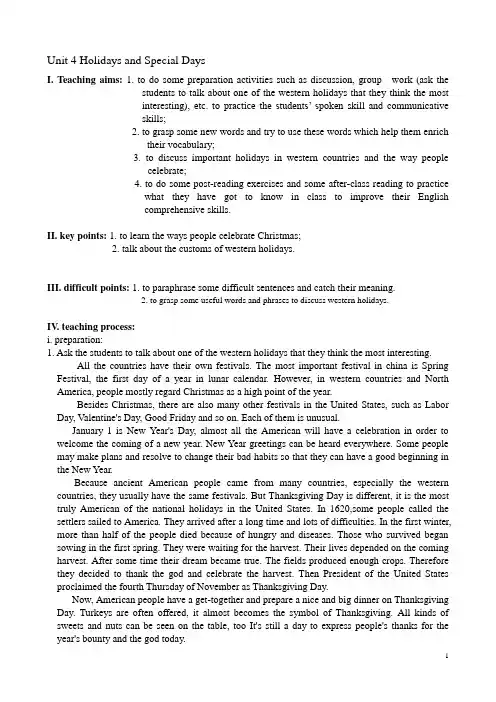
Unit 4 Holidays and Special DaysI. Teaching aims: 1. to do some preparation activities such as discussion, group work (ask thestudents to talk about one of the western holidays that they think the mostinteresting), etc. to practice the students‟ spoken skill and communicativeskills;2. to grasp some new words and try to use these words which help them enrichtheir vocabulary;3. to discuss important holidays in western countries and the way peoplecelebrate;4. to do some post-reading exercises and some after-class reading to practicewhat they have got to know in class to improve their Englishcomprehensive skills.II. key points: 1. to learn the ways people celebrate Christmas;2. talk about the customs of western holidays.III. difficult points: 1. to paraphrase some difficult sentences and catch their meaning.2. to grasp some useful words and phrases to discuss western holidays.IV. teaching process:i. preparation:1. Ask the students to talk about one of the western holidays that they think the most interesting.All the countries have their own festivals. The most important festival in china is Spring Festival, the first day of a year in lunar calendar. However, in western countries and North America, people mostly regard Christmas as a high point of the year.Besides Christmas, there are also many other festivals in the United States, such as Labor Day, Valentine's Day, Good Friday and so on. Each of them is unusual.January 1 is New Year's Day, almost all the American will have a celebration in order to welcome the coming of a new year. New Year greetings can be heard everywhere. Some people may make plans and resolve to change their bad habits so that they can have a good beginning in the New Year.Because ancient American people came from many countries, especially the western countries, they usually have the same festivals. But Thanksgiving Day is different, it is the most truly American of the national holidays in the United States. In 1620,some people called the settlers sailed to America. They arrived after a long time and lots of difficulties. In the first winter, more than half of the people died because of hungry and diseases. Those who survived began sowing in the first spring. They were waiting for the harvest. Their lives depended on the coming harvest. After some time their dream became true. The fields produced enough crops. Therefore they decided to thank the god and celebrate the harvest. Then President of the United States proclaimed the fourth Thursday of November as Thanksgiving Day.Now, American people have a get-together and prepare a nice and big dinner on Thanksgiving Day. Turkeys are often offered, it almost becomes the symbol of Thanksgiving. All kinds of sweets and nuts can be seen on the table, too It's still a day to express people's thanks for the year's bounty and the god today.April Fool's Day is another interesting festival. It began in France and was very popular at that time. It was celebrated in nearly all the western countries later. In the early 18th century, the tradition was taken to the United States by the Englishmen who moved to America early. On April 1,people will play jokes on others and they may decorate their houses as if it was Christmas or Near Year's Day. It's very interesting to join the parties on April Fool's Day. People may make some pretty but fake dishes, for example, the ice-cream may be covered with tomatoes. "Have a lovely day!" "You are an April fool!" "These words can be often heard on April Fool's Day. People won't be unhappy if others play jokes on them at that day.2. Holiday wordsHolidays and Special Days in U.S.AThe American calendar is filled with numerous holidays. The following table shows some of the more popular holidays. Important national holidays have been indicated in bold face.Most non-essential government offices will be closed on these days. (Fire, Ambulance and Police are always open.) Banks and post offices also tend to be closed on these days, and many businesses will give their employees the day off.It is also important to be aware of the holidays of people of other religious faiths. For example, important Jewish holidays include Yom Kippur, Rosh Hashanah, Sukkoth, Chanukah, and Passover. Yom Kippur, Rosh Hashanah, and Sukkoth occur in the fall. Chanukah occurs in December, near Christmas. Passover occurs in March or April, near Easter.3. Reading a Rhyme1) Who do you think wrote the rhyme?It might be a child who is between 7 and 12 years old. He or she lost his/ her milk teeth. His/her two front teeth have not grown out and his/her classmates might make fun of him/ her. So he/ she asked Santa Claus to give him/ her two front teeth.Student A: This rhyme is written by a child (6-7 years old) who has no front teeth.Student B: This rhyme is written by an old man/woman who has lost his/her front teeth. (He/She ca n‟t pronounce the sound “s” without his/her front teeth.)Student C: This rhyme is written by a young man who has lost his front teeth in a fight and is often teased by others.Student D: This rhyme is written by an advertiser trying to promote the sales of a certain product containing calcium which is good for children‟s teeth.Student E: This rhyme is written by the parent of a baby whose front teeth haven‟t grown yet and who wants to wish its parents Merry Christmas.(The baby is too young to write such a rhyme.)2) Which Christmas custom is reflected in it?Making a wishStudent A: People exchange gifts with each other.Student B:People wish each other “Merry C hristmas".Student C: People make wishes on Christmas and their wishes will come true.Student D: Children get a lot of presents on Christmas3) If you‟re to make a wish, what will it be?Wishes might be: pass TEM 4, find a part time job, buy a computer, buy a car, learn how to drive, own a large house, publish a bookStudent A: Wish everyone has the most advanced computer.Student B:Wish I can receive many presents and can do whatever I want to do.Student C: Wish our country develops more quickly in the next fifty years and that ourcountry will be the most powerful in the world on thecentennial anniversary of our country.Student D: Wish my best friend good luck.Student E: Wish my family members and all my friends and relatives happy, healthy, and prosperous.Student F: Wish I could stay in a cabin in the countryside with a peasant family, sit around the fire and tell stories to each other.Student G: Wish all my dreams will come true.4. What is this special day?April Fool‟s DayPeople play tricks on each other; Neighbor kids will play friendly tricks on you; your best friend will tease you; and even the media will makes jokes to fool the public. When someone is tricked, people say: “April Fool.”ii. listening-centered activities1. Listen to a passage and complete the following clues about “The Origin of Santa Claus”1. The custom of giving presents during Christmas goes back to the ancient Romans.2. In the Bible, the wise men brought gifts to Jesus on the 12th day after his birth.3. In some countries of Europe, the gifts are supposed to be brought in by Saint Nicholas, a bishop who was regarded as a special friend of the children.4. When the Dutch came to New York, they brought the traditions of Saint Nicholas with them.5. In America the date of Santa Claus‟s arrival was moved to Christmas eve.The reason for this is that the gifts are supposed to be brought in by Saint Nicholas on the eve of his feast day, December the 6th. Saint Nicholas was a bishop of the 4th century who came to be regarded as a special friend of the children. So in various countries around the world Saint Nicholas returns every year with gifts for good children. When the Dutch came to New York, they brought the traditions of Saint Nicholas with them. They called him “San Nicholas.” And this soon was changed to “Sankt Klaus”, and then Santa Claus. But in America the date of Santa Claus‟s arrival was moved to Christmas eve. And gradually his red costume, the reindeer, and his home at the north pole became part of the tradition.2. Spot Dictation:and because it meant they would have a period of rest from work afterwards. They would make merry and have a great holiday. Even though it was November, they considered it the beginning of the new year! When the Romans conquered Europe, they changed this time of celebration to the first of January. From then the coming of the new year was a symbol of a new life with new hope for the future. This custom and this meaning has lasted to this day. We celebrate the new year hoping it will bring us a good life!3. Background knowledge about Valentine’s Day:Several different stories are told about the origin of Saint Valentine's Day. One legend dates as far back as the days of the Roman Empire. According to the story, Claudius, the Emperor of Rome, wanted to increase the size of his army. He knew that it would be easier to get young men who were not married to join. Therefore he made a rule that no young man could marry until he had served a certain number of years in the army.A priest named Valentine broke the rule and secretly married a great many young people. Finally, Claudius found out about Valentine and put the priest in prison, where he remained until his death on February 14.After his death, Valentine was made a saint, and the day of his death was named Saint Valentine's Day. It became the custom for lovers to send each other messages on this day. Now Saint Valentine's Day is a time for people to give roses or chocolates and to send greetings.4. role playWork with your partners to make a conversation in the following situations:1) You ring your friend Lisa on Christmas Eve.Tom: Hi! Lisa. Is that you? It‟s Tom.Lisa: Merry Christmas! Tom.Tom: You too. What are you going to do during the holidays?Lisa: I‟m going to visit my parents and my brothers back home.Tom: Have a safe trip! Then. You know what? I‟m going to China for my holidays. I hope that will be exciting.Lisa: I‟m sure it will.2) You and your girlfriend/boyfriend celebrate Valentine‟s Day.Jack: Happy Valentine‟s Day, dear!May: Oh! I can‟t believe you remembered!Jack: How can I forget? There are reminders all over town. Everywhere I go I see signs that tell me to buy flowers and chocolates for the woman I love. So, here, please accept these flowers and chocolates.May: Thank you so much. I cooked a special dinner for you tonight. Happy Valentine‟s Day to you!3) You are discussing with your friend about the New Year‟s resolution.Peter: Have you made a New Year‟s resolution yet, Mark?Mark: No, I never make New Year‟s resolu tions. I did for a few years, but I never kept them. Now I don‟t even bother to make them. What about you?Peter: I‟ve made a resolution to lose weight.Mark: I don‟t think you need to lose weight. You look just fine.Peter: Thank you! I appreciate that comment.5. video clip1) What do you know about Thanksgiving Day?2) If you have an opportunity to give thanks to somebody, whom will you give thanks to first? And how?iii. reading-centered activities1. What is Christmas?The word Christmas comes from the words Cristes maesse, or "Christ's Mass." Christmas is the celebration of the birth of Jesus for members of the Christian religion. Most historians peg the first celebration of Christmas to Rome in 336 A.D.Christmas is both a holiday and a holy day. In America it is one of the biggest event of the year (especially for kids), and for members of the Christian religions it is an important day on the religious calendar.Christmas Day, the 25th of December, is the biggest festival(节日)celebrated in the Christian countries of the world. Although everyone enjoys Christmas Day,it is particularly enjoyed by children, who get very excited because of the presents they know they are going to receive. Small children believe that their presents are brought by Father Christmas(圣诞老人).Father Christmas is a kind of old man who, the children are told, lives at the North Pole. He travels through the sky on a sleigh(雪撬) which is pulled by reindeers(驯鹿) and loaded with(装满) presents. Stopping on the roof of houses, he enters by climbing the chimney(烟囱).When small children go to bed on Christmas Eve, they hang a stocking at the end of their beds. Their parents warn them not to try to look at Father Christmas, or he will not leave them anything. When they wake, they find theirstockings filled with presents. Children are very excited on Christmas morning and always wake up early.Christmas is also a family celebration. As any members of the family as possiblegather to eat, play party games and watch the special Christmas programmes on TV.The federal government, all state governments, all schools/colleges/universities and the vast majority of businesses in America give employees one or two days off at Christmas, making it an important holiday (other federal holidays are: New Year's Day, Martin Luther King Day, Washington's Birthday, Memorial Day, Independence Day, Labor Day, Columbus Day, Veterans Day, Thanksgiving). In the Roman Catholic calendar, Christmas is one of six holy feast days celebrated in America, the others being: Circumcision (New Year's Day), Ascension, Assumption (Mary's assumption into heaven, August 15), All Saints (November 1), and the Immaculate Conception (December 8).Historians are unsure exactly when Christians first began celebrating the Nativity of Christ. However, most scholars believe that Christmas originated in the 4th century as a Christian substitute for pagan celebrations of the winter solstice. Before the introduction of Christmas, each year beginning on December 17 Romans honored Saturn, the ancient god of agriculture, in a festival called Saturnalia. This festival lasted for seven days and included the winter solstice, which usually occurred around December 25 on the ancient Julian calendar. During Saturnalia the Romans feasted, postponed all business and warfare, exchanged gifts, and temporarily freed their slaves. Many Romans also celebrated the lengthening of daylight following the winter solstice by participating in rituals to glorify Mithra, the ancient Persian god of light (see Mithraism). These and other winter festivities continued through January 1, the festival of Kalends, when Romans marked the day of the new moon and the first day of the month and year.Most scholars believe that Christmas originated in the 4th century as a Christian substitute for pagan celebrations of the winter solstice.Although the Gospels describe Jesus‟ birth in detail, they never mention the date, so historians do not know on what date he was born. The Roman Catholic Church chose December 25 as the day for the Feast of the Nativity in order to give Christian meaning to existing pagan rituals.2. introductionTo many people Christmas is no longer than a most important religious celebration. It means drinking and eating with abandon, and people are apt to participate in the conspicuous consumption. They hardly think of the less fortunate, one should remember all the good things and express his love to others.Work in pairs to explain the meanings of the following two sentences.Christmas isn‟t Christmas without a turkey.Turkey makes a really traditional Christmas.As we all know, turkey is the main food for Christmas in North America. Without turkey, Christmas won‟t be Christmas. Turkey always goes together with cranberry sauce. The turkey is stuffed with sausage and a mixture of bread, milk, eggs, onions and various herbs including summer savory.Turkey is like a very large chicken that usually weighs around 15 lbs. It takes around 7 hours to roast it in the oven. Some people use an electric knife to carve it into pieces.3. words and phrasesabsolutely: definitely and completely; unquestionably 完全地,确实地adj.: absolute relativeabsolutely relativelyalcoholic: containing or preserved in alcohol 含酒精的an alcoholic drinkn. alcoholapproach: to come near or nearer, as in space or time: 接近:靠近或靠得更近,如在空间或时间上; to come close to, as in appearance, quality, or condition; approximate: 近乎Spring approaches.The performance approaches perfection.n. a way or means of reaching something; an access:途径; the method used in dealingwith or accomplishing:步骤:an approach to the bridgea logical approach to the problemThe approach of winter brings cold weather.In some cases, different approaches ____the same scientific problem lead to conflicting theories.A)to B)in C)of D)for答案:A) the approach to...,为固定搭配,意为“…方法(途径)”。
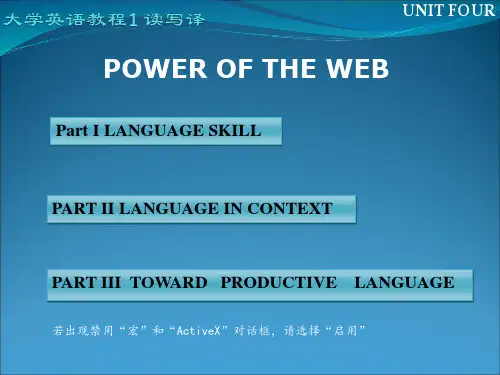
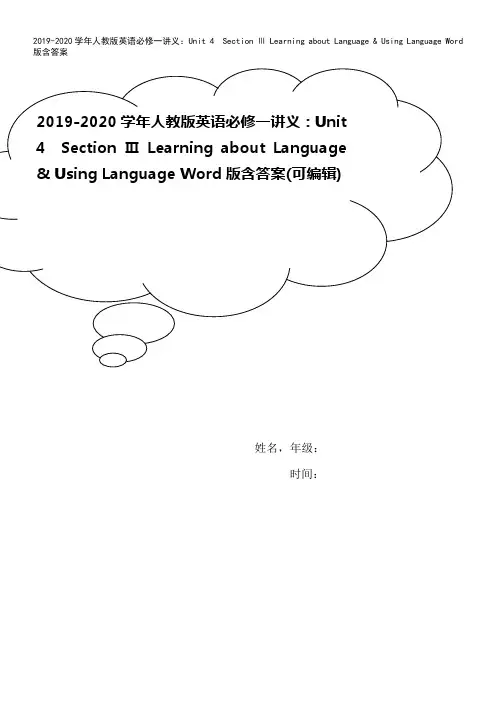
姓名,年级:时间:Section ⅢLearning about Language & Using Language重点单词写作词汇1。
damage n.& vt。
损失;损害2.sincerely adv。
真诚地;真挚地3。
express vt。
表示;表达n. 快车;速递4。
reporter n. 记者拓展词汇5。
frighten vt。
使惊吓;吓唬→frightened adj.受惊的;受恐吓的→frightening adj。
令人恐惧的6。
congratulation n.祝贺;(复数)贺词→congratulate vt.祝贺;恭喜;庆贺7。
judge n.裁判员;法官vt.断定;判断;判决→judgment n.审判;判决;裁判;判断8。
cyclist n.骑自行车的人→cycle vi。
骑自行车阅读词汇9。
bar n.条;棒;条状物10。
outline n. 要点;大纲;轮廓11。
headline n. 报刊的大字标题重点短语1。
a letter of invitation 邀请信2。
give a speech 作演讲3.be proud of 为……而自豪4.express thanks to sb。
表达对某人的谢意5。
give out 放出;分发;用光;耗尽6。
be known as 作为……而出名重点句型1.“介词+关系代词”引导的定语从句Your speech was heard by a group of five judges, all of whom agreed(所有的评委赞成)that it was the best one this year.2。
as引导定语从句,意为“正如,正像……”As you know(正如你所知道的), this is the day the quake happened。
.years ago。
3。
be doing sth. when.。
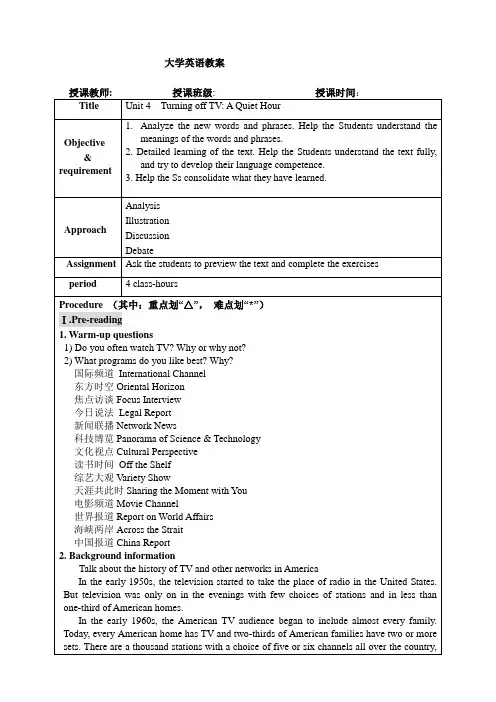
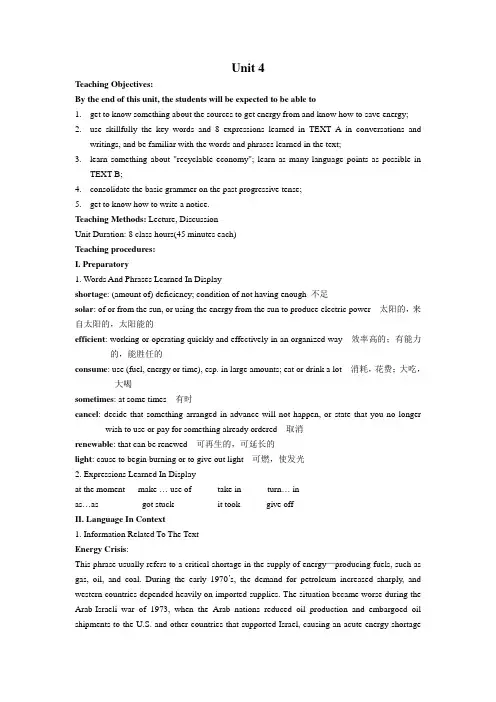
Unit 4Teaching Objectives:By the end of this unit, the students will be expected to be able to1.get to know something about the sources to get energy from and know how to save energy;e skillfully the key words and 8 expressions learned in TEXT A in conversations andwritings, and be familiar with the words and phrases learned in the text;3.learn something about "recyclable economy"; learn as many language points as possible inTEXT B;4.consolidate the basic grammer on the past progressive tense;5.get to know how to write a notice.Teaching Methods: Lecture, DiscussionUnit Duration: 8 class hours(45 minutes each)Teaching procedures:I. Preparatory1. Words And Phrases Learned In Displayshortage: (amount of) deficiency; condition of not having enough 不足solar: of or from the sun, or using the energy from the sun to produce electric power 太阳的,来自太阳的,太阳能的efficient: working or operating quickly and effectively in an organized way 效率高的;有能力的,能胜任的consume: use (fuel, energy or time), esp. in large amounts; eat or drink a lot 消耗,花费;大吃,大喝sometimes: at some times 有时cancel: decide that something arranged in advance will not happen, or state that you no longer wish to use or pay for something already ordered 取消renewable: that can be renewed 可再生的,可延长的light: cause to begin burning or to give out light 可燃,使发光2. Expressions Learned In Displayat the moment make … use of take in turn… inas…as got stuck it took give offII. Language In Context1. Information Related To The TextEnergy Crisis:This phrase usually refers to a critical shortage in the supply of energy—producing fuels, such as gas, oil, and coal. During the early 1970‟s, the demand for petroleum increased sharply, and western countries depended heavily on imported supplies. The situation became worse during the Arab-Israeli war of 1973, when the Arab nations reduced oil production and embargoed oil shipments to the U.S. and other countries that supported Israel, causing an acute energy shortagein these countries during the winter of 1973-1974, thus first came “energy crisis.”Renewable Energy Resources:“Rnewable enerny resources” refers to sources of energy which are capable of being renewed or cannot be depleted by use, such as watwe, wind, solar, biomass, geothermal and marine-based power.2. Introductory Remarks:In this article, the author discusses energy crisis. There are two main groups of energy: renewable and nonrenewable. Most of the energy we use comes from the nonnewable. These days, more people are using more machines to do things every day at work and at home, and we need more energy than we …ve ever needed. This rise trend of energy consupmtion is obvious. We are faced with a serios energy crisis.The fact of the decrease in the reserves of traditional fossil fuel and the increase in the consumption demand makes it very urgent to take measures to resolve the problem of energy crisis. So now people are working hard to find cleaner and renewable alternatives of energy, such as hydrogen energy, wind energy, solar energy and nuclear energy.3. Language Points:(1) more people are using more machines to do things every day at work and at home.现在进行时,表示近期的发展趋势或正在变化中的情况。
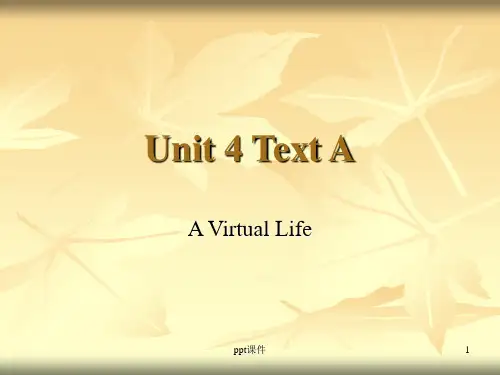
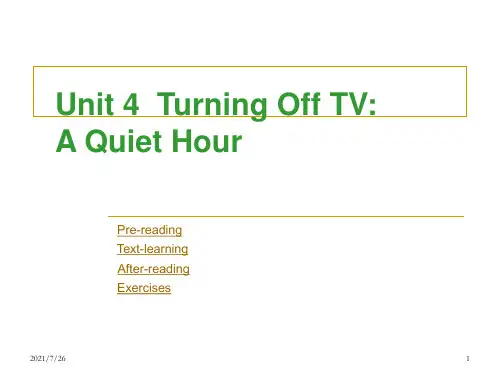
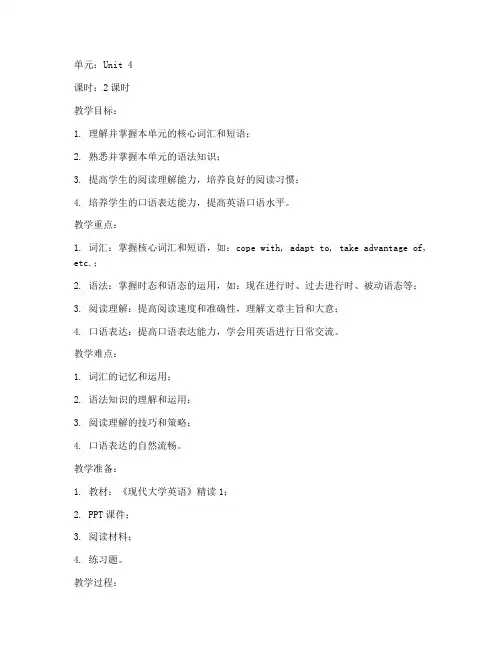
单元:Unit 4课时:2课时教学目标:1. 理解并掌握本单元的核心词汇和短语;2. 熟悉并掌握本单元的语法知识;3. 提高学生的阅读理解能力,培养良好的阅读习惯;4. 培养学生的口语表达能力,提高英语口语水平。
教学重点:1. 词汇:掌握核心词汇和短语,如:cope with, adapt to, take advantage of, etc.;2. 语法:掌握时态和语态的运用,如:现在进行时、过去进行时、被动语态等;3. 阅读理解:提高阅读速度和准确性,理解文章主旨和大意;4. 口语表达:提高口语表达能力,学会用英语进行日常交流。
教学难点:1. 词汇的记忆和运用;2. 语法知识的理解和运用;3. 阅读理解的技巧和策略;4. 口语表达的自然流畅。
教学准备:1. 教材:《现代大学英语》精读1;2. PPT课件;3. 阅读材料;4. 练习题。
教学过程:第一课时一、导入1. 通过图片、视频等形式,引入本单元主题:适应新环境;2. 让学生分享自己在适应新环境方面的经历和感受。
二、词汇教学1. 介绍本单元核心词汇和短语,如:cope with, adapt to, take advantage of 等;2. 通过例句、游戏等形式,帮助学生记忆和运用词汇。
三、语法教学1. 介绍时态和语态的运用,如:现在进行时、过去进行时、被动语态等;2. 通过例句、练习题等形式,帮助学生理解和运用语法知识。
四、阅读理解1. 介绍阅读理解技巧和策略;2. 让学生阅读课文,回答相关问题,检查阅读效果。
五、课堂小结1. 回顾本节课所学内容;2. 强调本单元重点和难点。
第二课时一、复习导入1. 复习上节课所学内容,如:词汇、语法、阅读理解等;2. 让学生分享自己在复习过程中的收获。
二、口语表达1. 通过角色扮演、小组讨论等形式,让学生用英语进行日常交流;2. 鼓励学生大胆开口,提高口语表达能力。
三、课堂小结1. 回顾本单元所学内容;2. 强调本单元重点和难点。
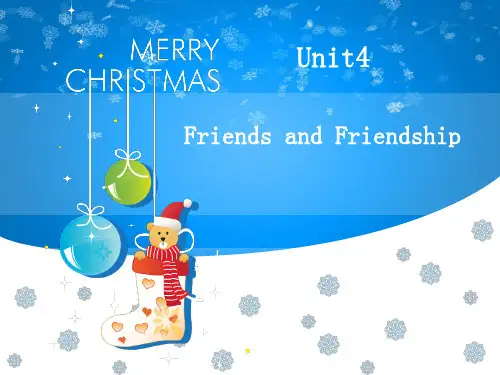
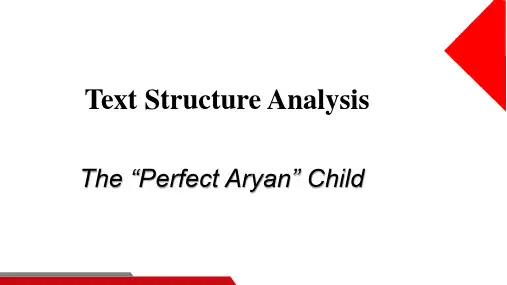
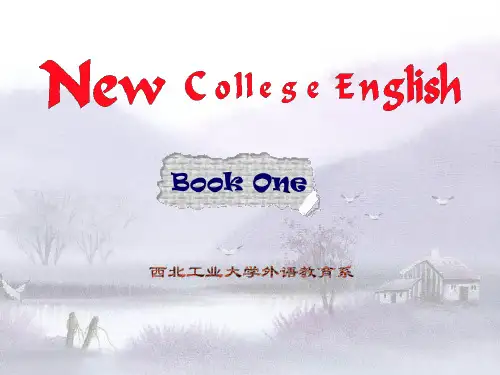
新编实用英语综合教程1第四版Unit4Unit 4: Health and FitnessIntroduction:In Unit 4 of the New Practical English Comprehensive Course 1, we will delve into the topic of health and fitness. This unit aims to equip learners with the necessary vocabulary, grammar, and functional language to discuss health-related topics effectively. Through engaging activities and exercises, learners will develop their ability to express personal opinions, give advice, and describe symptoms and remedies in English.1. The Importance of Staying Healthy:Maintaining good health is crucial for leading a fulfilling life. In this section, we will explore various aspects of health and discuss the importance of adopting a healthy lifestyle. Additionally, we will examine the role of exercise, nutrition, and mental well-being in promoting overall well-being.2. Discussing Symptoms and Seeking Medical Advice:In this section, we will focus on how to effectively communicate symptoms and illnesses to healthcare professionals. Learners will learn key vocabulary and phrases to describe common ailments, such as headaches, fever, or a sore throat. Moreover, they will practice engaging in a mock conversation with a doctor or nurse, seeking appropriate medical advice.3. Giving and Receiving Health Advice:Knowing how to give and receive health advice is vital for promoting well-being among family and friends. Learners will explore the language ofadvice and practice providing suggestions on various health-related topics. They will also learn how to respond to advice and engage in discussions about potential lifestyle changes.4. Making Healthy Choices:In this section, learners will develop their abilities to express personal preferences and make informed choices regarding health. By exploring different types of diets, exercise routines, and healthy habits, they will be able to discuss their own choices and explain their reasons behind them. Additionally, learners will engage in group discussions on controversial health topics and learn how to present their arguments persuasively.5. Healthy Living in the Modern World:The final section of this unit takes a closer look at the impact of modern technology on health and fitness. Learners will examine the pros and cons of various health-related apps, fitness trackers, and online resources. They will also discuss the potential risks of excessive screen time and explore ways to maintain a healthy balance between technology use and physical well-being.Conclusion:Unit 4 of the New Practical English Comprehensive Course 1 provides learners with essential language skills and knowledge to effectively discuss health and fitness in English. By grasping the vocabulary, grammar, and functional language related to health, learners will be better equipped to lead healthy lives and engage in meaningful conversations about well-being.。
#### 教学目标1. 培养学生对英雄主义话题的兴趣,提高口语表达能力。
2. 理解并掌握本单元的核心词汇和语法结构。
3. 提升阅读理解能力,学会分析文章结构和段落写作技巧。
4. 培养学生的写作能力,学会运用所学短语和句型进行写作。
#### 教学内容- Unit 4 相关文章阅读- 英雄主义话题讨论- 词汇学习- 语法结构学习- 段落写作技巧#### 教学方法- 任务型教学法- 情境教学法- 合作学习法#### 教学步骤##### 一、导入(5分钟)1. 通过提问的方式引入英雄主义话题,例如:“在你心中,谁是英雄?为什么?”2. 引导学生分享自己的看法,激发学生对英雄主义的兴趣。
##### 二、阅读理解(15分钟)1. 让学生快速阅读文章,了解文章大意。
2. 针对文章内容,提出问题,引导学生分析文章结构和段落写作技巧。
3. 学生分组讨论,分享阅读心得。
##### 三、词汇学习(15分钟)1. 引导学生关注本单元核心词汇,如:heroism, disaster, tornado, drought 等。
2. 通过例句、图片等形式,帮助学生理解和记忆词汇。
3. 学生进行词汇接龙游戏,巩固所学词汇。
##### 四、语法结构学习(15分钟)1. 介绍本单元的语法结构,如:一般现在时、一般过去时、被动语态等。
2. 通过例句、练习题等形式,帮助学生掌握语法结构。
3. 学生进行语法填空练习,巩固所学语法。
##### 五、写作技巧(15分钟)1. 讲解段落写作技巧,如:主题句、支持句、结论句等。
2. 学生根据所学短语和句型,进行段落写作练习。
3. 教师批改学生作业,并进行针对性指导。
##### 六、讨论与展示(15分钟)1. 学生分组讨论,分享自己对英雄主义的看法。
2. 每组选派代表进行展示,其他学生进行评价。
3. 教师总结讨论内容,强调英雄主义的重要性。
##### 七、总结与作业布置(5分钟)1. 总结本节课所学内容,强调重点。
必修 1 Unit 4 Earthquakes地震一.考纲词汇梳理·活用单词荟萃1.核心单词(1)_____________(vi.) 爆裂;爆发 (n.)突然破裂;爆发→_____________(过去式/过去分词)(2)_____________(n.) 废墟;毁灭 (vt.) 毁灭;使破产(3)_____________(vt.) 损害;伤害→_____________(n.) 伤害;损害→_____________(adj.)受伤的(4)_____________(vt.) 破坏;毁坏;消灭→_____________ (n.) 破坏;摧毁(5)_____________(v.) (使)震惊;震动(n.)休克;打击;震惊→_____________(adj.)令人震惊的→_____________(adj.)震惊的(6)_____________(n.&vt.) 援救;营救(7)_____________(vt.)使陷入困境(n.)陷阱;困境→_____________(过去式/过去分词)(8)_____________(vt.)埋葬;掩埋;隐藏→_____________ (过去式/过去分词)(9)_____________(vt.)使惊吓;吓唬→_____________ (adj.)受惊的;受恐吓的→______________(adj.)令人恐惧的(10)_____________(n.)祝贺;(复数)贺词→______________(vt.)祝贺(11)_____________(n.)裁判员;法官(vt.)断定;判断;判决→______________(n.)判断力;识别力(12)_____________(vt.)表示;表达(n.)快车;速递→______________(n.)表达;表情2.阅读单词earthquake ['??θkwe?k]地震quake [kwe?k]地震well [wel]井pipe [pa?p]管;导管million ['m?lj?n]百万event [?'vent]事件;大事nation ['ne??(?)n]民族.国家;国民canal [k?'n?l]运河.水道steam [sti?m]蒸汽.水汽dirt [d??t]污垢;泥土suffering ['s?f(?)r??]苦难.痛苦extreme [?k'stri?m; ek-]极度的brick [br?k]砖.砖块dam [d?m]水坝.堰堤track [tr?k]轨道.足迹.痕迹useless [?ju:sl?s]无用的.无效的.无益的electricity [,?lek'tr?s?t?; ,el-; ,i?l-]电,电流;电学disaster [d?'zɑ?st?]灾难.灾祸mine [ma?n]矿.矿山矿井miner ['ma?n?]矿工shelter ['?elt?]掩蔽.掩蔽处;避身处title ['ta?t(?)l]标题;头衔.资格reporter [r?'p??t?]记者。
必修一unit4I.重点词汇1.n.地震2.n.井3.adj.发臭的,有臭味的→v. 闻起来4.vi.爆裂,爆发;n.爆发5.n.百万6.n.事件,大事情7.n.民族,国家,国民8.vt. 毁灭,使破产;n.废墟,毁灭…9. n.苦难,痛苦10.adj.极度的→___________ adv.极度地11.vt. 损伤,伤害→n.伤害12.vt. 破坏,毁坏,消灭13.vi.& vt. (使)震惊,震动;n. 休克,打击,震惊14.n.& vt. 援救,营救15.n.陷阱;vt. 使陷入困境16.vt.埋葬,掩埋,隐藏17.n.避身处,掩蔽18.n.灾难~19. n.& vt. 损害,伤害20. n.祝贺;(复数)贺词21. vt. 使惊吓,吓唬→___________adj.受惊吓的,受恐吓的→__________adj.令人恐惧的22. n.骑自行车的人II.重点短语1.prepare to do sth/get prepared2. instead of3.a/the number of /thousands of4. shake hands with sb.5.burst into6. judging by/from7.be/feel honoured by 8. give honour to sb9.|10.dig out 10. as usual11.right away proud of13.at an endIII. 重点语法:定语从句一. 定义:在复合句中修饰名词或者代词的从句叫定语从句。
其中被修饰的词叫先行词。
连接主句与从句的词叫关系词。
He is a boy. The boy often goes to school late.He is the boy who often goes to school late.先行词关系词定语从句[二. 关系词的作用1.2.3.三. 关系词的分类1. 关系代词:2. 关系副词:四. 关系代词的用法Examples:1. A plane is a machine that can fly.>2. He is the man (that) I told you about.3. These are the trees which were planted last year.4. This recorder (which)he is using is made in Japan.5. A person who steals things is called a thief.6 The man (who)I talked with is our teacher..7. The man (whom)I nodded to is Mr. Li8. This is the little girl whose parents were killed in the great earthquake.9. We live in a house whose windows face south.【随堂训练】1. The place _______interested me most was the Children's Palace.A. WhichB. whereC. whatD. in which2. The factory ______we'll visit next week is not far from here.A. whereB. to whichC. whichD. in which(3. Is there anyone in your class ______family is in the countryA. whoB. who'sC. whichD. whose4. I'm interested in ______you have said.A. all thatB. all whatC. thatD. which5. He talked a lot about things and persons ________they remembered in the school.A. whichB. thatC. whomD. what五.关系代词的用法注意点(一)下列定语从句只能用that来引导:1.先行词被形容词最高级所修饰或者本身是形容词最高级This is the longest bridge that I have ever seen.2.先行词被序数词所修饰或者本身是序数词This is the first composition that he has ever written in English.3.先行词既包括人又包括物He talked about the teachers and schools that he had visited.4.先行词是everything, nothing, something, all, little, much, everybody等不定代词;Tell us everything that you know, please.5.先行词为the only, the very, all等词所修饰的定语从句He is the very person that the police are looking for.6.主句是who或which开头的特殊疑问句中的定语从句Who is the man that came this morningWhich is the bag that you lost7. 若句子中出现两个定语从句,一个用which时,另一个应用that.They built up a small factory, which produced things that could cause pollution.8.当先行词在句中作表语,而关系代词在从句中也作表语Shanghai is no longer the city that it used to be.!(二)下列定语从句只能用which来引导:1.在非限制性定语从句中,指物时只用which不用that.He was late for the opening ceremony, which was very surprising to me.2.当动词短语中的介词提前,指物时只用which.This is a house in which Lu Xun once lived.【随堂训练】1.I refuse to accept the blame for something ___ was someone else’s fault.A. whoB. thatC. asD. what2. This is the biggest laboratory ___ we have ever built in our school.A. whichB. whatC. whereD. /(3. The cattle and villagers ____ were evacuated immediately are very safe now.A. whichB. thatC. whatD. /4. You're the only person ______I've ever met ______could do it.A. who; /B. /; whomC. whom; /D. /; who5. Is oxygen the only gas _______ helps fire burnA. thatB. /C. whichD. itIV. 综合训练一、单项选择1. (2007 浙江)It is reported that the floods have left about______ people homeless.A. two thousandB. two- thousandsC. two thousandsD. two thousands of2.(2010年厦门高一检测)In that big earthquake all their houses were _______, so they had to build new ones.A. hurtB. harmedC. injuredD. destroyed~3.(2010年厦门高一检测)Almost _______ of the students in this class______ glasses, that is _______ of them.A. two thirds; wear; 60 percentB. two thirds; wear; 60 percentsC. two third; wears; 60 percentD. two thirds; wears; 60 percents4. (2010年河南模拟题) The lifeboat was sent out to ______ the sailors from the sinking ship.A. shelterB. rescueC. escapeD. trap5. (2009年东北三校联考) It is the hotel_____ located in the downtown______ he applied to for a job.A. that;whichB. which;thatC. that;whereD. /;that6. (2007年北京西城模拟题) It’s the first time this term we_____ an examination after class in the afternoon.A. didn’t have B. aren’t having C. don’t have D. haven’t had7. (2006年安徽合肥模拟) On hearing the news that her husband was killed by Pakistani separatists, the wife _____.…A. broke awayB. broke outC. broke downD. broke up8. (2007年陕西高考)----I think he is taking an active part in social work.----I agree with you ______.A. in a wayB. on the wayC. by the wayD. in the way9. The boy seems ______ a lot of books, for he knows so much.A. that he has readB. to readC. has readD. to have read10. A party was held _____ the heros who had helped save thousands and thousands of lives in the big earthquake.A. in time ofB. in honour ofC. in danger ofD. in place of二、完形填空;One afternoon,my son Adam asked me,“Are all people the same even if they are different in color”I thought for a minute,and then I said,“I’ll explain, _1 you can just wait until we make a quick 2 at the grocery store. I have something 3 to show you."At the grocery store,we 4 some apples—red,green and yellow ones.Back home.I told Adam,"It’s time to 5 your question.”I put oneapple of each 6 on the table.Then I looked at Adam, who had a 7 look on his face.“People are like apples.They come in all 8 colors,shapes and sizes.On the 9 ,some of the apples may not 10 look as delicious as the others.”As I was talking, Adam was 11 each one carefully.Then, I took each of the apples and peeled(削皮)them, 12 them back on the table, but 13 a different place.“Okay, Adam, tell me which is which.”He said, “I 14 tell. They all look the same now.” “Take a bite of 15 . See if that helps you 16 which one is which.”He took 17 , and then a huge smile came across his face. “People are 18 like apples! They are all different, but once you 19 the outside, they’re pretty much the same on the inside.”He totally 20 it. I didn’t need to say or do anything else.;1.A.although B.so C.because D.if2.A.stop B.start C.turn D.stay3.A.expressive B.encouraging C.informative D.interesting4.A.bought B.counted C.saw D.collected5.A.check B.mention C.answer D.improve6.A.size B.type C.shape D.class7.A.worried B.satisfied C.proud D.curious8.A.ordinary B.normal C.different D.regular9.A.outside B.whole C.table D.inside10.A.still B.even C.only D.ever[11.A.examining B.measuring C.drawing D.packing12.A.keeping B.placing C.pulling D.giving13.A.on B.toward C.for D.in14.A.mus tn’t B.can’t C.shouldn’t D.needn’t15.A.each one B.each other C.the other D.one other16.A.admit B.consider C.decide D.believe17.A.big bites B.deep breaths C.a firm hold D.a close look18.A.just B.always C.merely D.seldom19.A.put away B.get down C.hand out D.take off20.A.made B.took C.got D.did[三、阅读理解If you wish to become a better reader, here are four important things to remember about reading rate:● Knowing why you are reading or what you are reading to find out will often help you to know whether to read rapidly or slowly.● Some things should be read slowly throughout. Examples are directions for making or doing something, arithmetic problems, science and history books, which are full of important information. You must read such things slowly to remember each important step and understand each important ideas.● Some things should be read ra pidly throughout. Examples are simple stories meant for enjoyment, news letters from friends, pieces of news from local, or home-town, papers, telling what is happening to friends and neighbors.● In some of your reading, you must change your speed from fast to slow and slow to fast, as you go along. You will need to read certain pages rapidly and then slow down and do more careful reading when you come to important ideas which must be remembered.1. The underlined word "rate" in the first sentence means _______.A. fastB. slowC. speedD. skill2. Which should be read slowly according to the passage]A. Stories for enjoymentB. Arithmetic problemsC. Letters from friendsD. News from hometown newspapers3. How fast should we readA. The faster, the better.B. The more slowly, the better.C. Neither too fast nor too slow.D. It depends on what we are reading.4. According to the passage which of the following is NOT trueA. Read slowly when you are reading something important to you.B. Read fast when you are reading something unimportant to you.C. Read the materials that you are interested in slowly.D. Read the materials that you are interested in fast.@四、短文改错Dear Peter,Thanks very much on inviting me to your birthday party on Sunday.I’d like very much come,but I had an examination on Monday morning,It is a important exam,but I can’t afford to fail it.I’ll spend the whole weekend reading and prepare for it.So I’m really sorry that I won’t able to come this time.Hope you can understand.I’ll take this chance to wish you a wonderful time in your birthday.Happy birthday,Peter,and many happy return of the day!Yours,Li Ming五、单词拼写1. But the people of the city, who thought little of these__________(事件), were asleep as usual that night.2.Some of the rescue workers and doctors were _________(使陷入困境)under the ruins.3.Two-thirds of the people died or were ______(伤害)during the earthquake.4. After the earthquake , everywhere people looked nearly everything was __________(毁坏).5. The army ___________(组织)teams to dig out those who were trapped to bury the dead.6.Back from the cinema, the couple were _________(震惊) on seeing their house broken in.7. All these difficulties were caused by natural _________(灾难).8. After __________ (电)was cut off, the lights went out.9. Workers built __________(避难所) for survivors whose homes had been destroyed.10.The soldiers are trying to help rescue the ____________ (幸存者) after the earthquake.六、书面表达许多人现在都在努力学习英语。
Part I Get StartedSection A Discussion1. How did you feel about your parents when you were a child? Did your attitude towards them change when you grew into a teenager? Explain the change, if any.2. What is the greatest difficulty you have encountered in the process of growing up?3. “Only adolescents will like adolescents.” What do you think this statement means? Why do you think people say this? Do you agree?Section B Quotes⊙You have to do your own growing no matter how tall your grandfather was.⊙When I was a boy of fourteen, my father was so ignorant I could hardly stand to have the old man around. But when I got to be twenty-one, I was astonished at how much the old man had learned in seven years.⊙The day the child realizes that all adults are imperfect, he becomes an adolescent; the day he forgives them, he becomes an adult; the day he forgives himself, he becomes wise.Part II Read and ExploreSection A: Fill in the blanks with relevant information from the text about changes in the writer’s attitude towards his father.1)When he was a child, the writer .2)When he was a teenager, the writer3)After the car accident, the writer ___Section B Key Words and Expressions for Text A (主要为中英互译练习)Para.1 settle in/into sth.get used to (new surroundings, a new job, etc.) 习惯于(新环境、新工作等)e.g. It didn’t take her long to settle into a new routine.英译汉:We only moved house last week and we haven’t settled in yet.NB: settle (sb.) in/into sth. 在这个短语中,动词settle后也可以加宾语;介词into和in可以互换,例如:We settled the children in/into new schools when we moved to London.Para. 2 beam:1. v./n.1) smile brightly and happily 笑,眉开眼笑试翻译如下例句(注意beam后面介词的不同):(1)Maggie beamed at her friend with admiration.(2)He beamed on his visitors.(3)The old lady opened the door with a beam.查一查:通过查词典,看看beam还有什么常用的意思?Para.9 enroll: v.[(as, in)] make (oneself or another person) officially a member of a group [常与as或in连用]吸收(某人)为成员;(使)入会(入学,入伍);登记,注册e.g. 1. We enrolled him as a member of the society.我们吸收他为会员。
2. She decided to enroll in the history course.试翻译:NB:enroll为American English拼法,在British English中,该词拼写为enrol,二者对应的名词形式分别为enrollment和enrolment。
Para.11would give anything/a lot/the world (to do sth.):would very much like (to do or have something) 非常愿意做(或拥有某事物),愿付出一切做(拥有)e.g. People tend to give anything for money when they are young; but when they get old they would giveanything for health.试翻译:我愿付出一切代价见到那位超级巨星。
Para.12awkward: adj.1. causing difficulty or uncomfortable feelings; inconvenient or embarrassing 尴尬的,为难的,麻烦的;棘手的e.g. 1) Aunt Lena came to visit us at an awkward time.试翻译:2) There was an awkward silence, when no one knew what to say._________________________________________________________________2. not smooth or grateful; ungainly (行动)笨拙的;(姿势)别扭的e.g. The child is still awkward with his chopsticks.试翻译:Para.13 in one’s own right:because of a personal claim that does not depend on anyone else 根据自己的能力或合法权利(而不依赖其他因素)e.g. 1) He was born into a farmer’s family and became a scientist in his own right through hard work.2) Elizabeth II is Queen in her own right. _________________________________________Collocation:as of right/by right 基于正当的权利stand on one’s own rights 坚持自己的权利within one’s rights 不超越自己的权利范围Para.17 be sick of:feel annoyance, dislike, and impatience from too much of something 感到厌倦;对……厌烦e.g. 1) I am sick of your complaints, be quiet! _______________________________________2) Get out! I am sick of the sight of you.__________________________________________________________________Para.20 wander: vi. (in, off)1. walk or move in a leisurely, casual or aimless way 漫步,闲逛,游荡e.g. The children wandered in the woods. _________________________________________________2. move slowly from a fixed point or place 迷路,迷失方向e.g. The child wandered off and got lost. ____________________________________________________3. (of a person or thoughts) be or become confused and unable to make or follow ordinary conversation(人或思想)走神,开小差;错乱e.g. He realized his audience’s attention was beginning to wander.试翻译:Collocation:wander about/over the world 漫游世界wander from the subject/point 离题wander from the path of righteousnessNB: 注意wander和wonder是形近词,但是意思不相同。
wonder表示“惊讶, 怀疑, 想知道”。
Para.22survey:v. look at, examine, or consider sth. as a whole 纵览,审视,全面地观察e.g. Have the house surveyed before you offer to buy it.试翻译:回忆一下,我们还学过这个单词什么意思?Para.22sustain: v.1. suffer (harm or loss) 蒙受,遭受(伤害或损伤)e.g.1) sustain a fatal injury 遭受致命的伤害2) sustain losses 蒙受损失2. keep (sb. or sth.) alive or in existence 支持,维持e.g. You should eat good sustaining food, i.e. food that gives strength.试翻译:CF:back, uphold, support & sustain这些动词均有“支持,支援,拥护”之意。